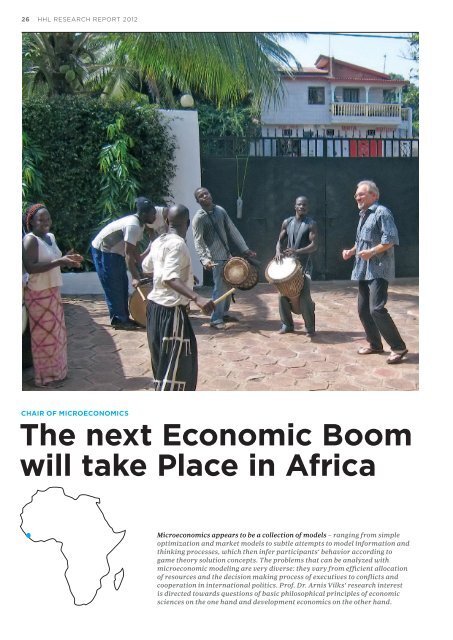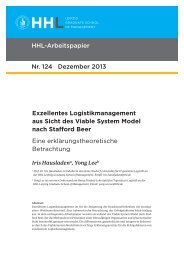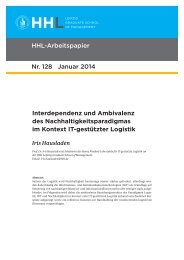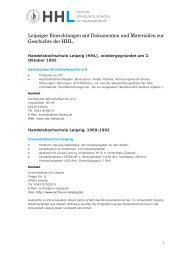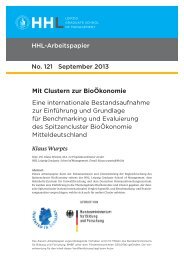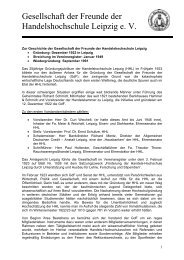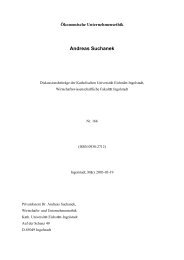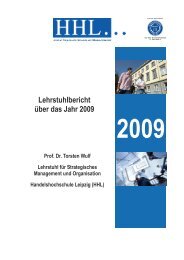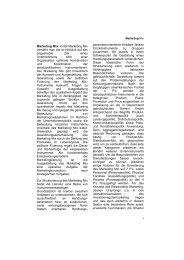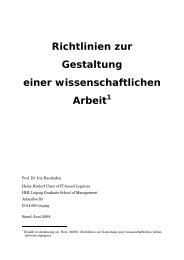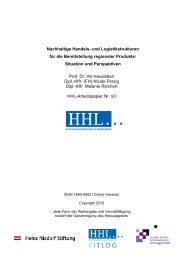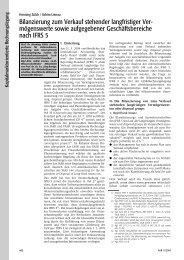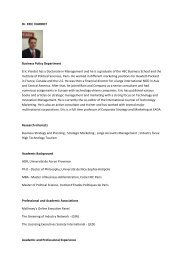Bio- and regenera- tive Medicine as an important growth Market
Bio- and regenera- tive Medicine as an important growth Market
Bio- and regenera- tive Medicine as an important growth Market
You also want an ePaper? Increase the reach of your titles
YUMPU automatically turns print PDFs into web optimized ePapers that Google loves.
26 HHL RESEARCH REPORT 2012 ECOnOMiCS And REguLATiOn 27<br />
cHair oF MicroeconoMicS<br />
the next economic Boom<br />
will take place in africa<br />
Microeconomics appears to be a collection of models – r<strong>an</strong>ging from simple<br />
optimization <strong><strong>an</strong>d</strong> market models to subtle attempts to model information <strong><strong>an</strong>d</strong><br />
thinking processes, which then infer particip<strong>an</strong>ts‘ behavior according to<br />
game theory solution concepts. The problems that c<strong>an</strong> be <strong>an</strong>alyzed with<br />
micro economic modeling are very diverse: they vary from efficient allocation<br />
of resources <strong><strong>an</strong>d</strong> the decision making process of execu<strong>tive</strong>s to conflicts <strong><strong>an</strong>d</strong><br />
coopera tion in international politics. Prof. Dr. Arnis Vilks‘ research interest<br />
is directed towards questions of b<strong>as</strong>ic philosophical principles of economic<br />
sciences on the one h<strong><strong>an</strong>d</strong> <strong><strong>an</strong>d</strong> development economics on the other h<strong><strong>an</strong>d</strong>.<br />
“Sierra Leone‘s integration in the global<br />
economy is, in no small part, obstructed<br />
by the ignor<strong>an</strong>ce <strong><strong>an</strong>d</strong> stereotypes often<br />
found in the ‚developed‘ countries,” says<br />
Prof . Dr . Arnis Vilks . During a research<br />
term Vilks traveled the country for five<br />
weeks . His conclusion: “The next <strong><strong>an</strong>d</strong><br />
probably l<strong>as</strong>t economic boom of our<br />
time will take place in Africa .” And still<br />
it is unknown to the broad section of<br />
the public in Germ<strong>an</strong>y that this country,<br />
which until ten years ago w<strong>as</strong> suffering<br />
through a cruel civil war, h<strong>as</strong> developed<br />
into a peaceful, politically stable <strong><strong>an</strong>d</strong>, to<br />
a large extent, democratic country with<br />
a low crime rate <strong><strong>an</strong>d</strong> loads of different<br />
investment opportunities .<br />
Vilks‘ seminar about ethical leadership<br />
w<strong>as</strong> met with wide popularity . For the<br />
four-day long course 23 particip<strong>an</strong>ts had<br />
to be selected from 100 applications to<br />
keep the group at a workable size <strong><strong>an</strong>d</strong><br />
not to exceed the limited budget of the<br />
Wittenberg Center for Global Ethics<br />
which fin<strong>an</strong>ced the seminar . “We talked<br />
about globalization, business ethics,<br />
corruption, constitutional legality,<br />
democracy <strong><strong>an</strong>d</strong> economic development,<br />
<strong><strong>an</strong>d</strong> the particip<strong>an</strong>ts often discussed<br />
with such <strong>an</strong>imation that it w<strong>as</strong> hard to<br />
follow what w<strong>as</strong> being said,” says Vilks .<br />
The particip<strong>an</strong>ts were junior employees<br />
from economics, politics, science <strong><strong>an</strong>d</strong><br />
non-govern mental org<strong>an</strong>izations .<br />
Decent Salaries<br />
There are very m<strong>an</strong>y of the latter in<br />
Sierra Leone‘s capital <strong><strong>an</strong>d</strong> they are<br />
considered good employers <strong>as</strong> they are<br />
usually fin<strong>an</strong>ced by foreign investors<br />
<strong><strong>an</strong>d</strong> pay their staff decent salaries .<br />
“Decent” in this context me<strong>an</strong>s that a<br />
coordinator or project leader of such<br />
<strong>an</strong> org<strong>an</strong>ization c<strong>an</strong> earn USD 1000 or<br />
more per month while a police officer,<br />
for example, earns no more th<strong>an</strong> USD<br />
50 per month . The average per capita<br />
income in Sierra Leone converts to USD<br />
300 or USD 760 if the higher purch<strong>as</strong>ing<br />
power of a Dollar is taken into account<br />
in the conversion . So, Sierra Leone‘s<br />
inhabit<strong>an</strong>ts have to m<strong>an</strong>age with <strong>as</strong><br />
much money <strong>an</strong>nually <strong>as</strong> a Hartz-<br />
IV (Germ<strong>an</strong> unemployment benefit)<br />
recipient receives per month .<br />
“It is hardly surprising that we kept<br />
returning to the issue of income in our<br />
seminar,” says Vilks . Particip<strong>an</strong>ts <strong>as</strong>ked<br />
whether the “small” corruption of a police<br />
officer whose salary c<strong>an</strong>not provide<br />
for his family is surprising . Another<br />
discussion topic w<strong>as</strong> the temptation<br />
for corruption of politici<strong>an</strong>s who have<br />
dealings with western colleagues, who<br />
e<strong>as</strong>ily earn ten times <strong>as</strong> much, <strong><strong>an</strong>d</strong> with<br />
entrepreneurs <strong><strong>an</strong>d</strong> m<strong>an</strong>agers, who at<br />
times earn a thous<strong><strong>an</strong>d</strong> times <strong>as</strong> much .<br />
M<strong>an</strong>y young Sierra Leone<strong>an</strong>s are very<br />
committed to the economic <strong><strong>an</strong>d</strong> social<br />
development of their home country .<br />
A prime example is Ibrahim B<strong>an</strong>gura,<br />
a Ph .D . student of Prof . Dr . Vilks . The<br />
young m<strong>an</strong>, who grew up in Freetown,<br />
graduated from Fourah Bay College –<br />
the oldest University in Western Africa,<br />
founded in 1827 – with a Bachelor in<br />
History <strong><strong>an</strong>d</strong> Political Science, <strong>as</strong> well <strong>as</strong><br />
a M<strong>as</strong>ters degree in “Gender Studies” .<br />
In 2006, Horst Köhler‘s initia<strong>tive</strong><br />
“Partnership with Africa” brought him<br />
to a big international Africa Conference<br />
in Wittenberg . After returning to<br />
Freetown, he <strong><strong>an</strong>d</strong> some like-minded<br />
people founded the “International<br />
Hum<strong>an</strong> Rights <strong><strong>an</strong>d</strong> Rule of Law Training<br />
<strong><strong>an</strong>d</strong> Research Institute” which since h<strong>as</strong><br />
been training “Peace-Keeping Forces”<br />
for several international org<strong>an</strong>izations,<br />
<strong>as</strong> well <strong>as</strong> police <strong><strong>an</strong>d</strong> military staff .<br />
“His matter-of-fact but often also<br />
humorous view on Afric<strong>an</strong> mentalities<br />
<strong><strong>an</strong>d</strong> problems gives re<strong>as</strong>on to hope that<br />
through the commitment of young<br />
execu<strong>tive</strong>s, Sierra Leone c<strong>an</strong> realize<br />
the vision of their president to become<br />
one of the donor countries rather th<strong>an</strong><br />
belong ing to the recipients of international<br />
<strong>as</strong>sist<strong>an</strong>ce within 50 years,” says<br />
Vilks . “There are hardly <strong>an</strong>y re<strong>as</strong>ons why<br />
a long-l<strong>as</strong>ting economic boom like those<br />
in China or the small Asi<strong>an</strong> ‚Tiger‘ countries<br />
should not be possible in Western<br />
Africa . In those countries, the Chinese<br />
<strong><strong>an</strong>d</strong> Indi<strong>an</strong>s especially – <strong>as</strong> well <strong>as</strong> the<br />
Leb<strong>an</strong>ese – contribute to their countries‘<br />
development by me<strong>an</strong>s of entrepreneurial<br />
activities rather th<strong>an</strong> foreign<br />
aid .” Chinese construction machinery is<br />
everywhere, hardly <strong>an</strong>y from Germ<strong>an</strong>y<br />
is present . It seems <strong>as</strong> if Germ<strong>an</strong> entrepreneurs<br />
would rather accept a lower<br />
return th<strong>an</strong> a higher risk . “The risks here<br />
in Sierra Leone, however, are rather low,”<br />
says Vilks .<br />
Business opportunities<br />
Looking at the endless white beaches,<br />
the Professor for Economics sees opportunities<br />
for investment in tourism,<br />
for example . Mosquitoes which could<br />
spread Malaria hardly exist at those<br />
beaches due to a const<strong>an</strong>t breeze . The<br />
fact that tourism – given the appro priate<br />
conditions – is able to make a large contribution<br />
to economic development c<strong>an</strong><br />
be observed 1000 kilometers northwest<br />
of Sierra Leone: up until 2007, the isl<strong><strong>an</strong>d</strong>state<br />
Cabo Verde w<strong>as</strong> one of the “le<strong>as</strong>t<br />
developed countries” but now h<strong>as</strong> a percapita<br />
income (adjusted for purch<strong>as</strong>ing<br />
power) of about USD 3,800 <strong><strong>an</strong>d</strong> its<br />
infr<strong>as</strong>tructure already looks very similar<br />
to that of the C<strong>an</strong>ary Isl<strong><strong>an</strong>d</strong>s .<br />
Besides tourism, Sierra Leone‘s natural<br />
resources promise lucra<strong>tive</strong> business<br />
fields for investors – diamonds, gold,<br />
bauxite, tit<strong>an</strong>ium <strong><strong>an</strong>d</strong> iron ore – <strong><strong>an</strong>d</strong> l<strong>as</strong>t<br />
but not le<strong>as</strong>t, crude oil . Just off Sierra<br />
Leone‘s co<strong>as</strong>t huge fields of crude oil<br />
have been found; drilling rights are<br />
currently being negotiated with international<br />
oil comp<strong>an</strong>ies . According to Prof .<br />
Dr . Vilks, it is more th<strong>an</strong> likely that the<br />
upcoming big investments <strong><strong>an</strong>d</strong> the public<br />
revenue, which will, in all probability,<br />
incre<strong>as</strong>e considerably from drilling<br />
rights <strong><strong>an</strong>d</strong> taxes, will lead to long-l<strong>as</strong>ting<br />
economic <strong>growth</strong> .<br />
cHair oF<br />
MicroeconoMicS<br />
cHairHolder<br />
Prof. dr. Arnis vilks<br />
core coMpetencieS/<br />
reSearcH intereSt<br />
• philosophical foundations of<br />
economic sciences<br />
• development economics<br />
contact<br />
www.hhl.de/microeconomics


